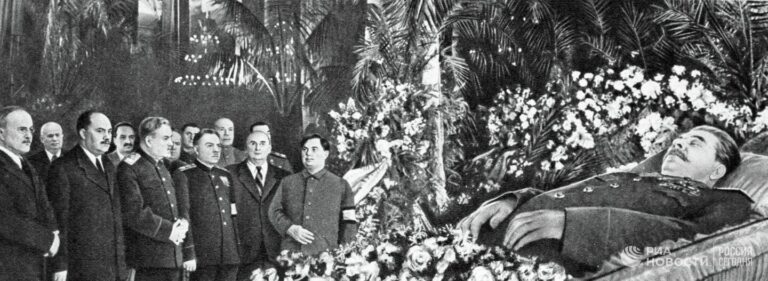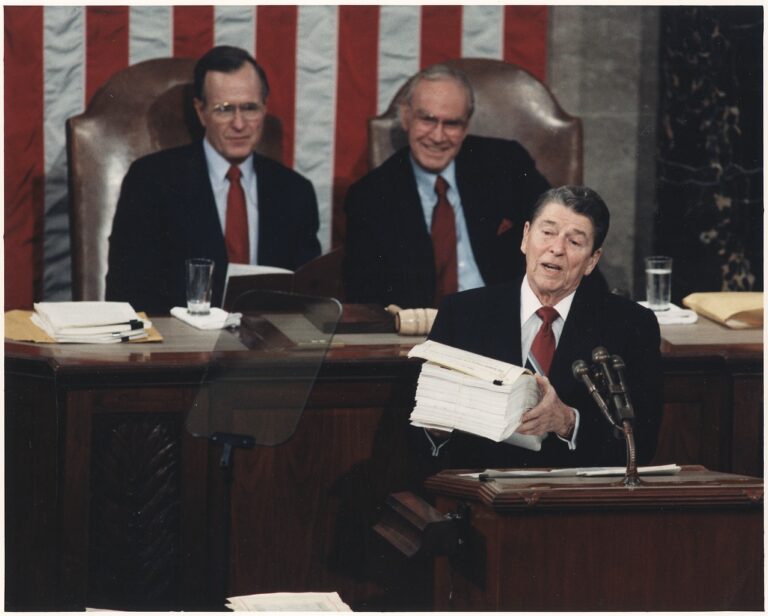On Reality Asserts Itself, Prof. Leo Panitch says as he became politically active, he concluded that neither the bureaucratic socialism in the Soviet Union or Canadian social-democracy would democratize the economy or the state – with host Paul Jay. This is an episode of Reality Asserts Itself, produced March 8, 2018.
STORY TRANSCRIPT
PAUL JAY: Welcome back to the Real News Network, and Reality Asserts Itself. I’m Paul Jay, and joining us again in the studio is Professor Leo Panitch. Thanks for joining us, Leo.LEO PANITCH: Hi, Paul.
PAUL JAY: One more time, Leo is Professor Emeritus and senior scholar at York University in Toronto. He’s the co-editor of the annual socialist register. He’s also coauthor of the UK Deutsche book Prizewinner, the Making of Global Capitalism, the Political Economy of American Empire.
Let’s pick up our conversation. If you didn’t watch part one, I suggest you do. This will make more sense.
You’re born in 1945. I know I grew up full of, I’m born in 1951, so you even more than me are in the immediate shadow of World War Two. I remember when I’m four or five years old singing songs out on the street, whistle while you work, Hitler was a jerk, Mussolini bit his peony now it doesn’t squirt. Every show on television was mostly World War Two dramas. What happened in the war was just all around me, and I assume even more you.
You grow up in an anti-fascist family, and then you’re about four or five years old and McCarthyism hits the United States, and while some Canadians like to believe it didn’t hit Canada, to a lesser extent but certainly to an extent it did. How did that effect your family, the political atmosphere you grew up in?
LEO PANITCH: Less than you would think. I certainly remember being told by my mother and father that my Aunt Rose, who had been a member of the communist party had burnt a signed copy of the History of the Soviet Union, Bolshevik, signed by Tim Buck the leader of the Canadian communist party, had literally burnt it because she was afraid that her husband who was a butcher would not be allowed to have his pension if the book was found in their house, as likely as it would be found in this second floor tenement apartment that they lived in.
PAUL JAY: Certainly there were Canadians fired from jobs as there were in the United States.
LEO PANITCH: Yes, but you can see how it would effect the working class person. Most people who were fired were people who were working as journalists, as teachers, they were the people who were more effected, but less effected of course in Canada, but effected certainly.
I wasn’t aware of it all that much. I was in fact most gob struck by it when I was a student activist. I was treasurer at the University of Manitoba student union, led a strike, a march on the parliament buildings on the legislature in Winnipeg against the raising of tuition fees, and when I got back to a family event, it was my in-laws’ house, my brother’s family, his wife’s family, I was greeted by someone at that event who had seen me on television leading that march, and he called me a communist.
PAUL JAY: How old were you?
LEO PANITCH: I was probably 19, and I was taken aback and shocked by this, and hurt by it I have to say, because I grew up in a milieu quite rightly in which I was not sympathetic to the Soviet Union. I became a socialist and a Marxist against the example of the Soviet Union. I think that happened to most people in my generation who got radicalized in that period. So to be called that would have been, not that I was a traitor in that sense, but that I was in some sense undemocratic, whereas I would have thought leading a march in favor of lower tuition fees that I was representing democracy and student influence above all. It had those kinds of reverberations in which people would use it in a way that probably didn’t have the same effect as it would be used on someone who was a communist.
PAUL JAY: Now there’s a difference between people who grew up in the milieu of critiquing, being opposed to what was developing in the Soviet Union and the attitude towards Marx. Is there any sense of Marx in the family as you’re growing?
LEO PANITCH: Sure. I mean of course one would hear in my household something about Marx. You more likely would hear something about someone who would be accused of being the Marxist, like your namesake, Paul, Paul Robeson, who was of course a hero in my household, even more so in my Aunt Rose’s, because he was identified as a communist, she was a communist, therefore she’d really identify him. But people like Paul Robeson, someone who is a black radical as well as a leftist standing up to McCarthyism, these people were heroes. He came to Winnipeg, indeed, appeared at the Labor Temple.
I remember, this is gonna sound odd, when I was invited to speak at the Labor Temple at a benefit for a left wing magazine some 15 years ago, going into a toilet stall and thinking to myself I’m probably sharing this with the spirit of Paul Robeson. It wasn’t so much Marx as people who were themselves be accused of being Marxist, perhaps. I never thought of myself as a Marxist. One didn’t growing up in a working class home in that sense. People didn’t define themselves that way. I remember it was only in second year university that I whispered to a friend or ended up writing that last book you just mentioned with Sam Gindon, I just had read the preface of the Critique of Political Economy, which I now think is pretty crude, but I remember reading that and whispering to Sam, I think I’m a Marxist.
I think one knew that that was a bit of a [free-ZAHN 00:06:15], it was you were going past where the left is safely goes within good company, or establishment company. I wanna say though that the Winnipeg I grew up in differently from others I think of my generation who were middle class or upper middle class, the children of lawyers or doctors or businessmen, I grew up in working class Winnipeg, not upwardly mobile. So my memories of the 1950s were much more about my dad being laid off every winter, my mother going to work as a night cleaner in the bank when my father got laid off. A lot of the left, a lot of socialist feminists in the 1970s developed this notion as a bad notion of the family wage. My mother was the strongest proponent of the family wage because when my dad wasn’t getting a pay increase, or was laid off and unemployed, she had to go out and be a night cleaner in a bank.
I would hear the word scab in a strike more often from my mother than I would from my father. I remember my father pulling me onto his lap when I was already I think in grade nine, came home at 4:00 and there he was at the kitchen table, and he pulled me on his lap and started crying, and I realized what had happened, he had either lost his job or been laid off that day. If he was in a bad mood, I got the sense it was because he’d been told off by some foreman, and that he was someone who was much more educated, not in a formal sense, than this bastard who had told him off. There was a certain resentment in the household that I could tell when we would go to the odd time to a synagogue, and my father would point to some rich businessman who could barely spell his name, but who was sitting next to the rabbi because he had contributed so much to the community, quote-unquote. There was a sense of class.
There was a sense of class that split the Jewish community, and I think that’s important to bring out when you talk of my Jewish roots, my Jewish background. What was particularly important to me, I think, was this awareness. During the post war period, the great heyday of the welfare state, et cetera, of how precarious life was even for a trade unionized working class person. People think that precarity is something that is recent, that didn’t exist back in the 1950s. What did change was that, and although it in some ways continued, was that the fraternal organizations that as they were known, that the various ethnic groups created for themselves before the welfare state. They would put pennies each week into a fund that would guarantee that if they had to go to a doctor, if one of them died, there would be a fund they could call on which would pay that fee if necessary, or pay for their funeral so they wouldn’t be buried in a pauper’s grave.
My father was very active. His greatest activity was in something called the Winnipeg Aid Society. He learned the Robert’s Rules of Order of running a meeting I think more there than in his union meetings. I often thought to myself not least because he was self educated, voraciously read the newspapers, was interested in politics, but also because he knew how to run a meeting, that he knew more about politics than my undergraduate political science students when I started teaching them. I was aware that that was something significant for a working class person.
PAUL JAY: Talking about the development of the welfare state and Canada, in your youth you go to a Tommy Douglas rally. Your father was involved in the CCF, and Tommy Douglas had a lot to do with developing what Bernie Sanders goes on and on about, the Canadian healthcare. What was that moment like for you, the enthusiasm about Tommy Douglas, and also how do you assess that now?
LEO PANITCH: The first socialist government in North America was the CCF, the Cooperative Commonwealth Federation government elected in 1944 in Saskatchewan, one of the great political scientists of the United States, Seymour Martin Lipset, writes his first book on that phenomenon. When you become a political scientist, that’s one of the key books you read in the postwar era, what produced this party, this third party, how did it happen, et cetera. Yeah, and Tommy Douglas was a hero in my household more than any Zionist you could name, more than Theodore Herzl or in terms of our earlier conversation about my dad being a social democrat and a labor Zionist. Tommy Douglas was a hero in our home.
PAUL JAY: The Bernie Sanders of his day, right?
LEO PANITCH: He was certainly more than the Bernie Sanders of his day, much more than the Bernie Sanders of his day because he was actually Premier of Saskatchewan, introduced the first hospital care program, and is seen by all Canadians now as the father of Canadian Medicare, of our socialized health system.
So there was this rally in Winnipeg, I remember very clearly, in 1957, I was 12 years old, it was during the election of ’57, my dad took me, it was probably my first big political meeting, and after it was over my dad got up and walked towards the stage. As he did, my father looked up and Tommy Douglas looked down, and Tommy Douglas said hello, Max, and my father, this working class person who went off to work in this dank factory everyday became a hero in my eyes, that Tommy Douglas, of course he was a great politician, and he knew activists in the party been around for by that point 20, 25 years in the party and knew many of them by name. It was not such a big deal, but to me my father became a superhero that day.
PAUL JAY: I had a somewhat similar moment. My parents took me to a Tommy Douglas rally at Mapleleaf Gardens, I must have been about six, seven years old, or something, but one of the events burnt into my memory. It’s a little bit of a segue, but I think it’s worth it. A lot of Americans with this debate about healthcare cannot understand how the heck did Canada ever have such a system, why didn’t the private insurance companies and such have the same kind of power. How does this come to be that you get such a development right across the border?
LEO PANITCH: It had to do of course with the development of a mass social democratic party. It had to do with that party becoming government of one of the provinces, and starting the ball rolling in the late 1940s, but then seeing it through in the face of a doctor’s strike in the early 1960s, right? It had to do with the fact that such a party looked upon the achievements of the British Labor government, above all the establishment of the National Health Service, as something that they were very able to use in Canadian political discourse to their favor. And since of course the Anglo tradition in Canadian political life, because we were after all the dominion of Canada, a colony of Britain before we became a colony of the United States, an informal colony of the United States, there would have been a certain influence even on conservatives by virtue of the British conservatives not undoing the National Health Service once it was established in Britain in the late 1940s.
Moreover, there was a conjuncture between late 1950s and the mid-1960s when the dominant liberals were being challenged and displaced very briefly by the conservatives, and had minority governments. In order to secure themselves back as the dominant party in Canada, the liberals always moved slightly to the left. And in so far as they were the minority governments, they needed the support of the social democratic party, by that point it was called the New Democratic Party. So there was those kinds of reasons going on.
Now the main thing is that it happened at that moment, it happened by the sixties. If it hadn’t happened then, you’re absolutely right that the insurance companies would have made given what happened with privatized medicine, with the extent to which they were accumulating profits out of people’s most basic needs for health. It would have made it much more difficult to get it later. The fact that it didn’t happen in the United States at the heyday of the New Deal, in so far as it didn’t happen under Kennedy and Johnson, although some moves were made in that direction, then it was much more difficult to take on all of those capitalist interests in that industry later.
PAUL JAY: We’ve just been doing a series on the Real News called Undoing the New Deal, and one of the points was that just on the eve of war, Henry Wallace, who became Roosevelt’s vice president, and others in the administration and Roosevelt was gonna go along with it, were gonna introduce a government health insurance plan, and then in order to rally the party including all the forces against the healthcare reform for the war, Roosevelt gave up on it.
LEO PANITCH: Yeah. You know, one wonders what would have happened if Roosevelt had not died when he did, if Truman who never would have been President of the United States except for the fact that he was a useful choice for vice president at the moment he was chosen.
PAUL JAY: To get rid of Wallace.
LEO PANITCH: To get rid of Wallace, exactly. Things might have been different. But again, capital in the United States was much more powerful than it was in Canada, as obviously as a political force.
PAUL JAY: You are excited, inspired at Tommy Douglas, at the age of 19 you’re leading a protest, though I have to add just to embarrass you you are at Eaton’s Department Store, junior executive …
LEO PANITCH: I was in high school.
PAUL JAY: Yeah. What the heck is that story?
LEO PANITCH: Every high school …
PAUL JAY: This is a big department chain at the time.
LEO PANITCH: It’s like Macy’s, yeah. It’s like Macy’s. Every high school in Manitoba, perhaps, but certainly in Winnipeg, were given the opportunity to appoint two high school students as the Eaton’s Junior Executive. Now what that essentially meant was that you got a blazer, a blue blazer with a logo, and the right to work Friday nights and Saturdays, and during the summer. So it guaranteed you a job. I used to sell underwear to farmers, long underwear, combinations we used to call them, to Canadian farmers who’d otherwise freeze in the winter. Yes, I was an Eaton’s Junior Executive, after I became known as a …
PAUL JAY: [crosstalk 00:18:06] little thing on the back that could undo the …
LEO PANITCH: Sure. No, exactly. Yeah. Vents, they were called. Much later when I became a well-known Marxist intellectual in Canada, someone anonymously sent me a photocopy of a page from the Saint John’s high school yearbook, which had a photograph of me and a photograph of a woman called Janet [Sukowski 00:18:37] who later became a Canadian ambassador. We were the Junior Executives that year, and there were photos of us in that yearbook as the Eaton’s Junior Executives. So the irony was obvious.
PAUL JAY: Not long after this 19 year old leads this protest, you do university, your first round of university. First four rounds is where?
LEO PANITCH: My first undergraduate degree was in economics and political science at the University of Winnipeg. I studied with a man who founded the Canadian Dimension Magazine, which next to Monthly Review is the oldest independent socialist magazine in North America now.
PAUL JAY: Cy Gonic.
LEO PANITCH: Yeah, Cy Gonic is his name. He’d just come back from Berkeley, where he had been involved in the free speech movement and the radical activities at Berkeley in the early 1960s.
PAUL JAY: What year were you in?
LEO PANITCH: That was I studied with him in ’63, ’64, ’65. He had come back in probably ’62. Some of my professors were Marxists, and that had some influence already. Certainly many of them were radicals. So and you know a lot of people were engaged in the anti-Vietnam struggles in Winnipeg, in the mid 1960s. I only went off to London in 1967 as a commonwealth scholar. I’m not sure I thought of myself as anything more than a left social democrat or a radical in that period, although I had whispered I think I’m a Marxist. Certainly I don’t think Cy Gonic thought of me as the most radical of his students.
PAUL JAY: Even at the time, and to some extent looking back, what’s the difference in your mind? What does it mean to say I’m whispering I’m a Marxist, versus a left social democrat, what’s the difference?
LEO PANITCH: Very good point. I don’t think I understood that then. I think it was only in light of the social democratic party’s failure to go beyond the reforms they had secured in welfare benefits and healthcare by the sixties and seventies that one began to be aware that those reforms were increasingly running up against their limits within a continuing capitalist dynamic, that they were gonna be constrained and maybe even undone unless you went beyond them to actually take the decisions about what’s invested, where it’s invested, what it’s invested for away from capital.
PAUL JAY: Meaning who has power.
LEO PANITCH: Meaning the democratization of the economy. I don’t think there was enough of an awareness until the sixties and my generation became very aware of it, of course, of how bureaucratic social democratic governments were, how they had been brought into the structures of the state in a way that didn’t democratize the state, that as the man I discovered at the London School of Economics by chance, who’s intellectual influence did change my life, Ralph Miliband, put it in his famous book parliamentary socialism, the first line of it reads of parties which take socialism as their goal the Labor Party is the most dogmatic, not in the sense of socialism, but in the sene of its commitment to parliamentarianism. And it was generally true that the social democratic parties became enveloped in the institutional structures of parliamentarianism, electoralism, but above all the bureaucratic structures of the departments that they were ministers of.
One got a sense of that in the sixties. That’s really I think what the new left was about. It was both a reaction against the soviet bureaucratism and also a reaction against the reformist bureaucratism. Whether it was the New Deal bureaucratism in the United States or the social democratic in Europe to some extent in Canada, you know, women on welfare were most frightened of their welfare social workers, of the income maintenance workers. They were the people who would show up in their houses and see whether there was an extra toothbrush in the glass, in which case they’d be thrown off welfare on the grounds that they happened to have a boyfriend, despite the fact they were single mothers. That was part of what was going on, I think, at that time, which led us against and beyond both Leninism and social democracy.
PAUL JAY: Okay. In the next segment of the interview, we’re gonna pick up Leo heads off to England, to go to university, as he just mentioned. That had a lot to do with transforming how he looked at the world, so please join us for the continuation of Reality Asserts Itself, on the Real News Network.






